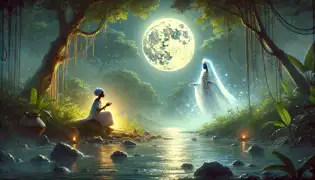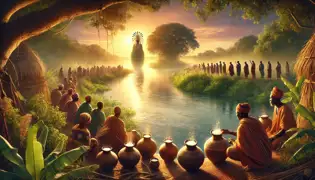The Senegal River, wide and glittering like liquid gold under the setting sun, is a lifeline for the people who dwell along its banks. Its waters nourish the land, fill the nets of fishermen, and whisper ancient secrets to those who listen. Yet, among its many mysteries, none is more captivating—or more feared—than the tale of Maam Kumba Bang, the River Spirit.
Legends say she is as old as the river itself, her form rising from the depths when the first humans arrived to drink from its waters. She is a protector, a mother, and, when crossed, an unforgiving force of nature. To this day, villagers swear by her existence, leaving offerings of millet, honey, and milk along the banks to honor her. And for good reason—those who disrespect Maam Kumba Bang rarely live to tell the tale. The village of Nder, nestled along a gentle bend in the river, was a place where life flowed as steadily as the water itself. Each morning, women with brightly patterned cloth wrapped around their heads would gather at the banks to fill their calabashes, their laughter mingling with the calls of herons. Fishermen in pirogues glided over the surface, their nets cast wide like silver veils. One elder, Papa Malick, often told stories about the river spirit to the children gathered around him in the evenings. His voice would drop to a conspiratorial whisper as he described her: “Maam Kumba Bang is not just a spirit—she is the river. Her hair flows like currents, and her eyes hold the storms. If you see her smile, you are blessed. But if she frowns...” He would pause, letting the silence hang heavy. “Then you have angered the waters.” The children’s eyes would grow wide, their imaginations painting pictures of the ethereal being he described. Some, like young Aissatou, were enchanted by the tales, seeing Maam Kumba Bang as a benevolent protector. Others, like brash Diarra, dismissed them as old men’s ramblings. Diarra was a fisherman, strong and stubborn, with a reputation for defying the old ways. “Why leave offerings for a ghost?” he would scoff when the women reminded him to honor the river. “The fish in the river are mine to catch, not hers to demand.” One fateful morning, Diarra rose before dawn, determined to prove his point. The river was calm, the water still and dark as polished obsidian. He paddled to a spot near the center, where the fish were said to be most plentiful. He cast his net with a confident flourish, humming a tune under his breath. The first haul was impressive—fat, silver fish wriggling in his nets. He chuckled to himself, but as he reached into the water to untangle the mesh, his hand brushed against something smooth and cold. Pulling it up, he realized it was a crown made of pearls, each one gleaming with an otherworldly light. “A gift for me,” he muttered, tucking the crown into his pouch. He had no idea that with this single act, he had sealed his fate. By the time Diarra headed back to shore, the sun was high, and the villagers had begun their daily routines. He proudly displayed his catch, but when he revealed the crown, the mood shifted. Gasps rippled through the crowd, and the elders exchanged uneasy glances. “Diarra,” said Mama Khady, an elderly woman with a voice like rustling leaves, “where did you find this?” “In the river,” he replied, puffing out his chest. “Perhaps the spirit wanted to reward me for my skills.” Mama Khady’s face darkened. “You fool! That crown belongs to Maam Kumba Bang. Return it before it’s too late.” Diarra laughed, waving her off. But as night fell, a strange tension filled the air. The river, so lively during the day, now seemed ominously quiet. Then, without warning, a roar erupted—a sound like thunder but deeper, as if the river itself was crying out. Diarra’s hut shook as water surged through the village, flooding the lower banks. From the rising mist, Maam Kumba Bang emerged, her form towering and radiant, her eyes fixed on the thief. “Diarra,” she called, her voice echoing like a drumbeat. “You have stolen what is mine. Return it, or face the wrath of the river.” Terrified but too proud to relent, Diarra shouted back, “You cannot frighten me! The river is for men, not spirits!” The villagers watched in horror as Maam Kumba Bang raised her hand. The water obeyed her command, sweeping over Diarra like a great hand. When the waves receded, he was gone. Only the crown remained, glinting ominously in the moonlight. Among those who had witnessed Diarra’s fate was Aissatou, a girl of sixteen with a voice so pure it seemed to carry the river’s own melody. Unlike Diarra, she had always respected Maam Kumba Bang, leaving offerings and singing praises to the spirit every full moon. A week after the incident, Aissatou stood at the river’s edge, her heart heavy. She began to sing, her voice carrying over the water like a gentle breeze. Her song was not of fear but of gratitude—for the river’s gifts, for its beauty, and for the spirit who guarded it. As she sang, the mist thickened, and a soft glow emerged. Maam Kumba Bang appeared, her form less fearsome than before. She listened, her expression thoughtful. “You sing with love for the river,” the spirit said. “Because of this, I will grant you a gift. Your voice will carry my wisdom, and through it, you will guide your people.” From that day forward, Aissatou became a leader in her village. Her songs warned of droughts and storms, and her advice led to bountiful harvests. The villagers saw her as a bridge between themselves and Maam Kumba Bang. Years passed, and the harmony between the villagers and the river spirit remained strong. But change was on the horizon. Foreign merchants, their ships heavy with iron and greed, arrived at the river, seeking to exploit its treasures. They dismissed the villagers’ warnings about Maam Kumba Bang, mocking their beliefs as primitive. Captain LeClair, a French trader with an iron will, ordered his men to dredge the riverbed for gold. The once-pristine waters grew murky, and fish became scarce. The villagers begged LeClair to stop, but he laughed. “There is no spirit here,” he sneered. “Only water and riches.” That night, as the villagers prayed for intervention, the river churned violently. Maam Kumba Bang appeared, her fury palpable. She towered over the ships, her voice like thunder. “You have desecrated my domain. Leave now, or face the consequences.” LeClair, drunk on arrogance, ordered his men to fire their cannons. The river roared in response. Waves rose like walls, smashing the ships to splinters. By morning, the waters were calm again, but the foreigners were gone—swept away by the river’s wrath. The story of Maam Kumba Bang is more than a tale; it is a reminder of the delicate balance between humanity and nature. The villagers continue to honor her, leaving offerings and singing songs of gratitude. Her legend has become a cornerstone of their identity, passed down through generations. Today, her name is invoked not only in prayers but also in calls for environmental preservation. Activists and scholars draw on her story to emphasize the importance of protecting the Senegal River and the communities that depend on it. Maam Kumba Bang is more than a spirit—she is a symbol of respect, balance, and the enduring connection between people and the natural world. Her tale resonates with timeless wisdom: that to live in harmony with nature is not merely an option but a necessity. The river flows on, carrying her story in its currents. And as long as its waters glisten under the sun, the spirit of Maam Kumba Bang will remain, a guardian and a guide for those who honor her.Whispers of the River
Diarra’s Hubris

The Spirit Appears
Aissatou’s Song

The Arrival of Outsiders

The Spirit’s Legacy

Conclusion



















